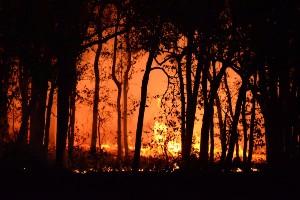Once-in-a-century UK wildfire threats could happen most years by end of century
24 March 2021

Extremely hot and dry conditions that currently put parts of the UK in the most severe danger of wildfires once a century could happen every other year in a few decades’ time due to climate change, new research has revealed.
A study, led by the University of Reading, predicting how the danger of wildfires will increase in future showed that parts of eastern and southern England may be at the very highest danger level on nearly four days per year on average by 2080 with high emissions, compared to once every 50-100 years currently.
Wildfires need a source of ignition which is difficult to predict, so wildfire risk is typically measured by the likelihood that a fire would develop after a spark of ignition. This fire danger is affected by weather conditions. As temperatures rise and summer rainfall decreases, conditions highly conducive to wildfire could be nearly five times more common in some regions of the UK by the latter part of the century.
In the driest regions, this could put habitats at risk for up to four months per year on average, the scientists found.
Professor Nigel Arnell, a climate scientist at the University of Reading who led the research, said: “Extremely hot and dry conditions that are perfect for large wildfires are currently rare in the UK, but climate change will make them more and more common. In future decades, wildfires could pose as much of a threat to the UK as they currently do in the south of France or parts of Australia.
“This increased fire danger will threaten wildlife and the environment, as well as lives and property, yet it is currently underestimated as a threat in many parts of the UK. This research highlights the growing importance of taking the threat of wildfires seriously in the UK, as they are likely to be an increasing problem in future.”
'Exceptional danger'
In the new study, published in the journal Environmental Research Letters, scientists looked at how often different regions of the UK would experience conditions that made it highly likely that any wildfire that occurred would become established. They calculated future fire danger based on the latest UKCP18 climate scenarios with both low and high emissions of greenhouse gases, using a version of the Met Office’s Fire Severity Index which is used to define levels of wildfire danger.
They found the average number of ‘very high’ danger days each year will increase significantly in all parts of the UK by 2080. Excluding London, southern and eastern England were predicted to be worst affected, with the average number of danger days more than quadrupling, up to 111 days in the South East and 121 days in the East of England on average.
Significant increases by 2080 were also seen in the West Midlands (from 13 up to 96 days). Even traditionally wet parts of the UK would dry out for longer, leaving them vulnerable to severe fires for several weeks on average each year, including Wales (5 to 53), Northern Ireland (2 to 20), and West Scotland (3 to 16).
‘Exceptional danger’ days – currently extremely rare across the UK – were found to become more commonplace across the UK by 2080, with the East of England (0.02 to 3.55), East Midlands (0.03 to 3.23), South East (0.01 to 1.88), and Yorkshire and Humberside (0.01 to 1.55) all seeing large increases in numbers of days each year when these conditions were present.
No coordinated fire strategy
The research showed that the projected increase in fire danger is predominantly due to hotter temperatures, less rainfall, lower humidity and stronger winds expected across the UK in future decades due to climate change.
Wildfires pose environmental, health and economic risks. Although the UK records tens of thousands fires each year, these are almost all very small, especially in comparison to those in countries and regions like Australia and California, which have the kinds of hotter, drier climates forecast for the UK in future decades.
Although the UK has experienced very low losses from wildfires so far, up to £15m is estimated to be spent each year tackling them. There is no coordinated strategy for wildfire in England, only a voluntary forum which does not have powers to set standards or guidance.
Notable examples of wildfires in the UK are the Swinley Forest fire on the Surrey/Berkshire border in May 2011 that threatened critical infrastructure; the Saddleworth Moor fire in the Peak District in May 2018 and Wanstead Flats fire in London in July 2018 that both led to residents being evacuated; residential and commercial property loss in Marlow, Buckinghamshire, in July 2018; and an extensive fire in Moray, Scotland, in April 2019 that endangered an onshore wind farm.
While natural weather and climate conditions directly affect the ’danger’ of a wildfire becoming established, the ‘risk’ of a wildfire occurring often depends on deliberate or accidental human acts. This study, therefore, does not indicate how likely wildfires are to occur, only their likely severity if one did occur.
The University of Reading hosts the SPECIAL research group, part of the Leverhulme Centre for Wildfires, Environment and Society. Professor Sandy Harrison, a palaeoclimatologist in the University’s Department of Meteorology, is associate director of the Centre. The £10m Centre is the first to seek to address wildfires from a global perspective, to improve the ability to understand, predict and manage them.
Full reference:
Arnell, N., Freeman, A., Gazzard, R. (2021); ‘The effect of climate change on indicators of fire danger in the UK’; Environmental Research Letters; https://doi.org/10.1088/1748-9326/abd9f2

